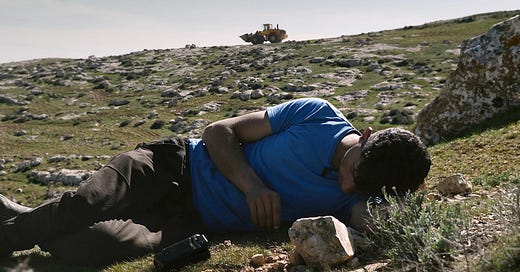If you see only one movie this winter, make it No Other Land, the searing documentary about Israel’s occupation of the West Bank made by a courageous quartet of Palestinian and Israeli activists and journalists. One of the most acclaimed films of the year and best documentary winner in Berlin, it shows Israel’s inch-by-inch, year-by-year appropriation of Palestinian land in heartbreaking detail.
The film zeroes in on Masafer Yatta, a small corner of the territories, where Israel’s courts ruled in 2022 that the military could raze a collection of centuries-old Palestinian villages to make way for a tank-training installation. Periodically a group of soldiers in armored vehicles rolls up the hill, leading a procession of bulldozers. They surround a single home and harangue the people inside to evacuate and drag their belongings outside. While the family frantically collects its possessions, corrals screaming children, and helps the elderly to safety, a crowd gathers to protest the demolition. Their outrage is moot: A bulldozer tears into the building, and soon it’s a pile of rubble.
Once night falls, the villagers return to begin rebuilding their home in the dark.
The film also traces a second, more intimate storyline. When Yuval Abraham, a freelance reporter for an Israeli paper, comes to Masafer Yatta in 2019 to report on the conflict, the activist Basel Adra and his family are naturally suspicious. Hearing that Adra has footage of their encounters with the Israeli military going back years and years, Abraham suggests they work together to properly tell the story. (Hamdan Ballal, another activist from Masafer Yatta, and Rachel Szor, an Israeli cinematographer, complete the quartet, but they stay mostly off-camera.)
Slowly the two men develop a friendship. Some of the most exciting footage in the film is shot from the dashboard of Abraham’s car, as the pair springs into action during moments of panicked anxiety or drives back to Adra’s home in exhausted resignation. They are not merely colleagues, more like brothers. Toward the end of the film, Adra jokes, “So, when are we getting married, Yuval?” That would be a tricky proposition, Abraham replies, and they rehash the impossibility of their situation. Their solidarity, at least, offers a glimmer of a different future.
As of yet, this film—though it’s considered the front-runner for Best Documentary at the Oscars in March—does not have a U.S. distributor. A version of this review first appeared in Bloomberg Pursuits on Oct. 19.




